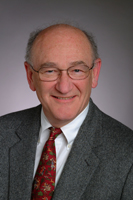Pioneer and leader in veterinary medicine recognized by College's Alumni Association
 Stephen Ettinger DVM ’64 will be recognized with the Daniel Elmer Salmon Award for Distinguished Alumni Service, given annually by the Alumni Association of the College of Veterinary Medicine at Cornell University. To be presented at the New York State Veterinary Conference, on October 2, 2010, the award recognizes and honors Cornell College of Veterinary Medicine graduates who have distinguished themselves in service to the profession, their communities or to the College.
Stephen Ettinger DVM ’64 will be recognized with the Daniel Elmer Salmon Award for Distinguished Alumni Service, given annually by the Alumni Association of the College of Veterinary Medicine at Cornell University. To be presented at the New York State Veterinary Conference, on October 2, 2010, the award recognizes and honors Cornell College of Veterinary Medicine graduates who have distinguished themselves in service to the profession, their communities or to the College.
The award is named in honor of Cornell's first DVM graduate, who is remembered for his pioneering work in controlling contagious animal diseases in the early 20th century. D.E. Salmon was one of Dr. James Law's first students when Cornell University opened its doors in 1868. He received the Bachelor of Veterinary Science degree from Cornell in 1872 and he was awarded the Doctor of Veterinary Medicine degree in 1876, the first DVM degree to be awarded in the United States of America. Salmon’s contribution to veterinary medicine and human medicine were numerous and significant, including private practice, government service, foreign service, food inspection, and identifying significant bacterial diseases, including salmonella.
Born and raised in Queens, N.Y., Dr. Ettinger is a member of Cornell’s Board of Trustees, the College’s Dean’s Leadership Council and a former member of the Advisory Council. He is a fellow of the American College of Cardiology, the American Heart Association, and the American College of Veterinary Internal Medicine (Cardiology and Internal Medicine). He has served as a member of numerous advisory councils as well as an expert witness for the California Board of Examiners in Veterinary Medicine. He has been recognized with the Centennial Award of Merit from the University of Pennsylvania, School of Veterinary Medicine, the Practitioner of the Year from the American Animal Hospital Association, the World Small Animal Veterinary Association Scientific Achievement Award, the British Small Animal Veterinary Association Bourgelat Award and is an American College of Veterinary Internal Medicine Kirk Awardee. He continues as the senior editor of the Textbook of Veterinary Internal Medicine, now in its 7th Edition, and used in most veterinary teaching schools throughout the world. Professionally, Dr. Ettinger has published numerous scientific articles and chapters mostly involving his area of specialization, clinical cardiology.
Dr. Ettinger began his life-long love of veterinary medicine as a teen, while working on dairy farms in Pennsylvania. As a student at Cornell’s College of Veterinary Medicine, he explored various facets of the profession, considering large animal and comparative research careers before selecting small animal medicine as his predominant focus. His decision-making process was largely influenced by “two of the finest mentors,” according to Dr. Ettinger, anyone could hope to have: Drs. Robert Kirk and Howard Evans.
“Any student would have been incredibly fortunate to have just one mentor who matched the caliber of Dr. Kirk and Dr. Evans,” said Dr. Ettinger, who has mentored more than 120 interns and more than 50 residents himself. “I was incredibly fortunate to have two mentors who were wonderful teachers and role models, enthusiastic and positive about the profession and my opportunities to influence it.”
After graduating, Dr. Ettinger completed an internship and residency at the Animal Medical Center and then accepted a post doctoral fellowship in cardiology at the Bronx Veterans Administration Hospital and the Animal Medical Center, sponsored by the National Heart Institute and the National Institutes of Health.
“The post doctoral fellowship with an organization that served people was an opportunity to get more specialized training,” said Dr. Ettinger, who partnered with several veterinarians to open the first group specialty referral practice in the nation in California in 1971. “It was an opportunity to bring some of knowledge that had already been learned in human health to my patients. As professionals with specialized training—it’s our obligation to serve our family, the profession, and the public at large. We’ve been put in a certain place in life for a reason. In the end, we should give back and we should give back enthusiastically. That’s the ying and the yang of life.”





